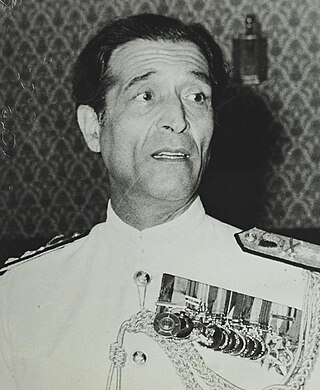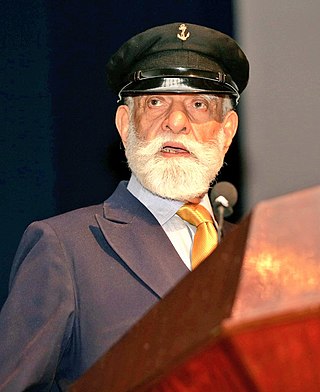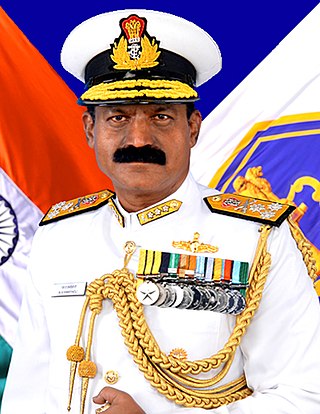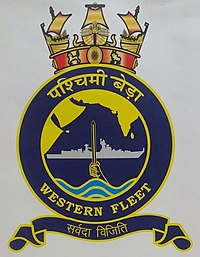
PNS/M Hangor (S-131) was a Daphné-class diesel-electric submarine that served in the Pakistan Navy from 1969 until its decommissioning in 2006. It is the first submarine to sink a ship after World War II.

Admiral Arun Prakash, PVSM, AVSM, VrC, VSM is a former Flag Officer of the Indian Navy. He served as the Chief of the Naval Staff from 31 July 2004 to 31 October 2006 and as the Chairman of the Chiefs of Staff Committee from 31 January 2005 to 31 October 2006. He is one of India's most decorated naval officers.

The Western Naval Command is one of the three command–level formations of the Indian Navy. It is headquartered in Mumbai, Maharashtra. As the senior–most of the three formations, the command is responsible for the all naval forces in the Arabian Sea and western parts of the Indian Ocean and the naval establishments on the west coast of India.
The Indo-Pakistani Naval War of 1971 refers to the maritime military engagements between the Indian Navy and the Pakistan Navy during the Indo-Pakistani War of 1971. The series of naval operations began with the Indian Navy's exertion of pressure on Pakistan from the Indian Ocean, while the Indian Army and Indian Air Force moved in to choke Pakistani forces operating in East Pakistan on land. Indian naval operations comprised naval interdiction, air defence, ground support, and logistics missions.

Vice Admiral Rustom Khushro Shapur 'Rusi' Ghandhi, PVSM, VrC was a former flag officer in the Indian Navy. He last served as the Flag Officer Commanding-in-Chief Western Naval Command from 1977 to 1979. He is the only officer to have commanded ships in all wars and conflicts post Independence. He commanded the frigate INS Betwa (1959) during the Annexation of Goa, the destroyer INS Khukri (F149) during the Indo-Pakistani War of 1965 and the cruiser INS Mysore (C60) during the Indo-Pakistani War of 1971.

Admiral Radhakrishnan Hari Kumar is a serving flag officer in the Indian Navy. He is the 25th and current Chief of the Naval Staff (CNS). Previously, he served as the Flag Officer Commanding-in-Chief, Western Naval Command. In his prior appointments, he served as the Chief of Integrated Defence Staff, Chief of Personnel, Controller Personnel Services, the Flag Officer Commanding Western Fleet, Flag Officer Sea Training and the Chief of the Staff of the Western Naval Command. He was the Commandant of the Naval War College, Goa and served as a naval advisor to the government of Seychelles. He is an alumnus of National Defence Academy, the Naval War College, the Army War College, Mhow and the Royal College of Defence Studies.

Vice Admiral Manohar Prahlad Awati, PVSM, VrC was a Flag Officer in the Indian Navy. He last served as the Flag Officer Commanding-in-Chief (FOC-in-C) Western Naval Command. During the Indo-Pakistani War of 1971, he was awarded the Vir Chakra for his command of the Arnala-class anti-submarine corvette INS Kamorta (P77). The admiral was also known as the "Father of the Indian Navy's Circumnavigation Adventures".

The Eastern Fleet is a Naval fleet of the Indian Navy. It is known as the 'Sword Arm' of the Eastern Naval Command and called the Sunrise Fleet. It is headquartered at Visakhapatnam, Andhra Pradesh on the east coast of India. It is a part of the Eastern Naval Command and is responsible for the naval forces in the Bay of Bengal and parts of the Indian Ocean.

Flag Officer Commanding Western Fleet (FOCWF) is the title of the Indian Navy Officer who commands the Western Fleet, headquartered in Mumbai, Maharashtra. The FOCWF is a two star admiral holding the rank of Rear Admiral. The appointment is considered to be an important and a coveted one. The Current FOCWF is Rear Admiral C. R. Praveen Nair, who assumed office on 10 November 2023.

Vice Admiral Sree Harilal Sarma, PVSM was an Indian Navy admiral who served as Flag Officer Commanding Eastern Fleet (FOCEF) during the Indo-Pakistani War of 1971. He later served as the Flag Officer Commanding-in-Chief Eastern Naval Command from 1 March 1977 to 2 February 1978.

Flag Officer Commanding Eastern Fleet (FOCEF) is the title of the Indian Navy Officer who commands the Eastern Fleet, headquartered in Visakhapatnam, Andhra Pradesh. The FOCEF is a Two Star Officer holding the rank of Rear Admiral. The Current FOCEF is Rear Admiral Rajesh Dhankhar, who assumed office on 10 November 2023.

Vice Admiral Makarand Aravind Hampiholi, PVSM, AVSM, NM is a former flag officer in the Indian Navy. He last served as the Flag Officer Commanding-in-Chief, Southern Naval Command. Previously, he served as the Commandant of Indian Naval Academy and served as the Director General Naval Operations (DGNO) at Naval headquarters.

Rear Admiral Ajitendu Chakraverti was a Flag Officer in the Indian Navy. He served as the second Indian Flag Officer Commanding Indian Fleet, succeeding Rear Admiral Ram Dass Katari. He was the first Indian to be promoted to the high rank of Commodore in the Royal Indian Navy.

Vice Admiral Swaraj Parkash, PVSM, MVC, AVSM was a Flag officer in the Indian Navy. He was the Captain of the aircraft carrier INS Vikrant during the Indo-Pakistani War of 1971 for which he was decorated with India's second-highest military decoration, the Maha Vir Chakra. He later served as the second Director General of the Indian Coast Guard from 1980 to 1982.

Vice Admiral Vasudeva Anant Kamath, PVSM (1921–2017) was a former Flag officer in the Indian Navy. He was the founding Director General of the Indian Coast Guard, which he led from 1978 to 1980. He also served as the 4th Vice Chief of the Naval Staff (VCNS) from 1973 to 1977, the longest tenure in the Indian Navy's history. During the Indo-Pakistani War of 1971, he led the Southern Naval Area, for which he was awarded the Param Vishisht Seva Medal.
Vice Admiral Elenjikal Chandy Kuruvila, PVSM, AVSM was a former Flag officer in the Indian Navy. He was the Fleet commander of the Western Fleet during the Indo-Pakistani War of 1971, for which he was awarded the Param Vishisht Seva Medal. He later led the Southern Naval Area and then served as the chairman and managing director of Mazagon Dock Limited.
Vice Admiral Kankipati Appala Satyanarayana Zagapathi 'KASZ' Raju, PVSM, AVSM, NM is a former Flag officer in the Indian Navy. He last served as the Flag Officer Commanding-in-Chief Western Naval Command, from 1992 to 1994. A naval aviator, he was part of the Navy's first naval air squadron INAS 300 and was embarked on the Navy's first aircraft carrier INS Vikrant. During the Indo-Pakistani War of 1971, he was the executive officer of the Leopard-class frigate INS Brahmaputra (1957), for which he was awarded the Nao Sena Medal. He later commanded the Western Fleet and the Southern Naval Command.

Vice Admiral Mihir Kumar 'Micky' Roy, PVSM, AVSM was a flag officer in the Indian Navy. He last served as the Flag Officer Commanding-in-Chief Eastern Naval Command.

Vice Admiral Sameer Saxena, AVSM, NM is a serving Flag officer in the Indian Navy. He currently serves as the Chief of Staff, Eastern Naval Command. He earlier served as the Flag Officer Commanding Gujarat Naval Area, as the Flag Officer Commanding Western Fleet and as the Naval adviser to the High Commissioner of India to the United Kingdom at India House, London.

Vice Admiral Vineet McCarty, AVSM is a serving Flag officer in the Indian Navy. He currently serves as the Commandant of Indian Naval Academy. He earlier served as the Flag Officer Commanding Western Fleet and as India's Defence adviser at the Republic of Singapore with concurrent accreditation to the Philippines.

















